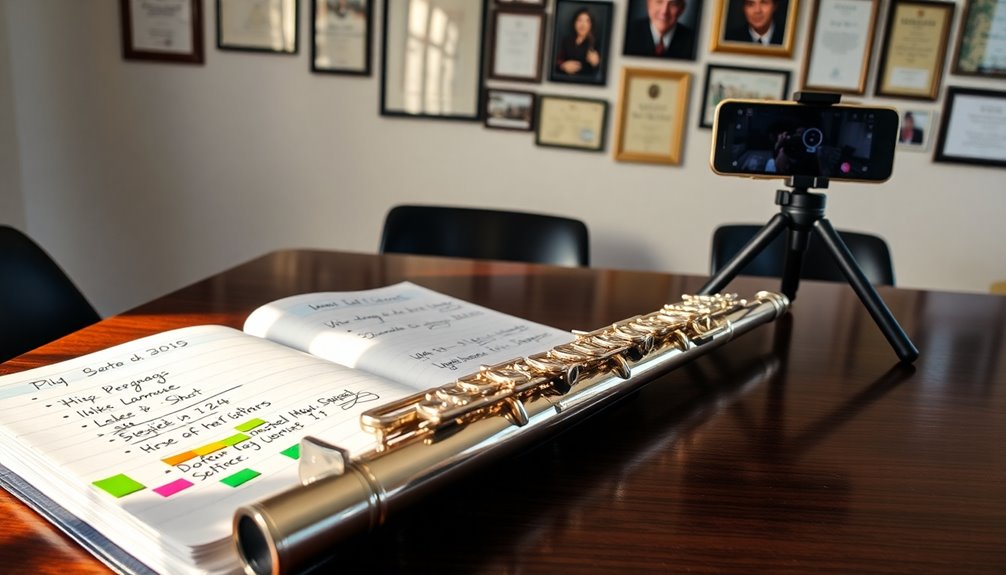To stay motivated as a flute player, start by setting achievable goals. Break your long-term aspirations into smaller milestones and celebrate each victory, no matter how small. Establish a consistent practice routine, mixing warm-ups, scales, and new pieces to keep things fresh. Don't hesitate to explore diverse genres and techniques; this experimentation can reignite your passion. Joining a supportive community of fellow musicians offers encouragement and new ideas. Finally, focus on the joy of playing rather than aiming for perfection. Embracing these strategies can help you thrive in your musical journey, leading to more insights along the way.
Key Takeaways
- Set achievable short-term goals to track progress and celebrate small victories, boosting motivation and confidence.
- Establish a consistent practice routine with varied activities to maintain engagement and prevent burnout.
- Explore diverse musical genres and styles to challenge your skills and reignite your passion for playing.
- Connect with a supportive community of fellow musicians for encouragement, collaboration, and shared experiences.
- Focus on the joy of playing, embracing challenges as part of your musical journey rather than striving for perfection.
Set Achievable Goals

Setting achievable goals is essential for your progress as a flute player. When you engage in goal setting, you're not just dreaming; you're creating a clear path toward improvement.
Start by defining your long-term aspirations, but break them down into short milestones. These smaller, manageable objectives will keep you motivated and make your goals feel less intimidating.
For instance, instead of aiming to master an entire piece in one week, set a goal to learn just a few measures each day. Celebrate these small victories, as they'll boost your confidence and reinforce your commitment to learning.
Track your progress regularly, and don't hesitate to adjust your goals as needed. If a particular milestone feels too challenging, it's okay to modify it. The key is to maintain momentum without overwhelming yourself. Additionally, reflecting on areas needing improvement will enhance your goal-setting process and ensure you stay focused on areas for improvement.
Create a Practice Routine

Creating a consistent practice routine is essential for developing your skills as a flute player. By establishing a schedule that works for you, you'll improve your time management and guarantee you dedicate enough time to practice techniques that enhance your playing. Start by setting aside specific times each week, treating these sessions like important appointments.
Next, divide your practice time into focused segments. For example, spend the first 10 minutes on warm-ups, followed by 15 minutes on scales, and then 20 minutes on a piece you're currently learning. This structure keeps your practice varied and engaging, preventing burnout. Practicing scales not only enhances your technique but also builds finger dexterity through regular practice.
Don't forget to be flexible! If something isn't working, feel free to adjust your routine. It's all about finding what resonates with you.
Additionally, consider setting short-term goals within your routine. Whether it's mastering a tricky passage or improving your tone, celebrating these achievements will keep you motivated.
Explore New Repertoire

As you continue your journey as a flute player, exploring new repertoire can reignite your passion and expand your musical horizons. Delving into different genres not only keeps your practice sessions fresh but also allows you to connect with various musical styles and cultures.
Whether it's classical, jazz, folk, or contemporary pieces, each genre offers unique challenges and rewards.
Start by selecting a few pieces outside your comfort zone. This repertoire diversity will push your technical skills and broaden your expressive capabilities. You might discover a love for improvisation in jazz or the intricate rhythms of world music.
Set specific goals for learning these new pieces, such as mastering a challenging passage or performing for friends. Celebrate your progress, no matter how small, to maintain motivation.
Don't hesitate to explore the vast online resources available, from sheet music to instructional videos. Engaging with these materials can inspire you and keep your enthusiasm alive. Additionally, incorporating diverse repertoire into your practice can significantly enhance your technical abilities and artistic expression.
Join a Community

Joining a community of fellow flute players can greatly enhance your motivation and growth as a musician. When you surround yourself with others who share your passion, you'll find encouragement and inspiration that can push you to new heights.
Whether it's joining local groups or connecting through online forums, being part of a community helps create a sense of belonging.
Participating in community events is a fantastic way to meet other flute players, share experiences, and gain insights. These gatherings often include workshops, masterclasses, and performances, which can provide valuable learning opportunities. Additionally, the experience of collaborating with others fosters a supportive environment that nurtures teamwork and communication.
You'll not only improve your skills but also expand your social circle.
Online forums are another great resource. They offer a platform to ask questions, share tips, and discuss challenges you face as a flute player.
Engaging in these discussions can spark ideas and motivate you to practice more consistently.
Record Your Progress

Connecting with fellow flute players can inspire you to take your practice to the next level, and one effective way to maintain that momentum is by recording your progress. Progress tracking is essential for growth, and using audio recordings can provide you with a clearer perspective on your playing evolution. When you listen back, you not only notice areas for improvement but also celebrate your achievements. Additionally, incorporating structured practice routines into your progress tracking can significantly enhance your growth as a flutist.
Here's a simple table to help you organize your progress tracking:
| Date | Recording Focus | Notes for Improvement |
|---|---|---|
| 01/01/2023 | Tone quality | Work on breath support |
| 01/15/2023 | Scales accuracy | Increase metronome speed |
| 02/01/2023 | Piece performance | Add dynamics and expression |
Find Inspiration From Others

Finding inspiration from others can greatly elevate your motivation as a flute player. Surrounding yourself with flute mentors can provide you with valuable insights and encouragement. Whether it's a teacher, a fellow musician, or a friend, these mentors can share their experiences and techniques that resonate with you.
You'll find that their stories can ignite your passion and remind you of your love for the flute.
Additionally, seek out inspirational performances. Watching skilled flutists perform can reignite your excitement and show you the possibilities within your own playing. Attend concerts, watch videos, or join online forums where musicians share their experiences.
Each performance showcases unique styles, techniques, and emotional expressions, which can inspire you to experiment and grow. Engaging with notable intermediate flute pieces can also enhance your appreciation and motivate you to explore new repertoire that challenges your abilities.
Don't hesitate to connect with other flute players in your community or online. Sharing your struggles and triumphs fosters a sense of belonging and motivation.
When you engage with others who share your passion, you'll find that inspiration flows freely. Remember, the journey of a flute player is much more enjoyable when you share it with others who lift you up and encourage you to reach new heights.
Embrace Challenges and Experiment

Everyone faces challenges, and as a flute player, embracing them can lead to significant growth. When you encounter difficulties, whether it's mastering a tricky passage or overcoming performance anxiety, view these obstacles as opportunities. Each challenge you face is a stepping stone toward improvement.
Don't shy away from experimenting freely with different styles, techniques, or even new pieces. Trying out unfamiliar genres can spark creativity and reinvigorate your passion for music. Remember, embracing failure is part of the process. Each misstep offers valuable lessons that will enhance your skills. The more you push your boundaries, the more you'll discover your unique voice as a flutist.
Connect with fellow musicians who also seek growth. Share your struggles and triumphs, and learn from one another. This sense of community can provide the support you need during tough times. Celebrate your progress, no matter how small, and keep challenging yourself. Additionally, understanding the importance of breath control can significantly improve your tone and overall performance.
Ultimately, the more you embrace challenges and experiment, the more you'll find joy in your flute journey. So take that leap, and let your passion guide you through every note and every obstacle!
Frequently Asked Questions
How Can I Overcome Performance Anxiety as a Flute Player?
To overcome performance anxiety, start by mastering breathing techniques. Deep, controlled breaths can calm your nerves and center your focus.
Next, use visualization strategies; picture yourself confidently playing in front of an audience, feeling the joy of sharing your music.
Practicing these methods regularly can build your confidence. Remember, everyone experiences anxiety at some point, and it's completely normal.
Embrace the moment, and trust in your preparation and talent!
What Are the Best Resources for Learning Flute Online?
Did you know that over 70% of music learners now prefer online resources?
When you're diving into flute lessons, online tutorials and virtual lessons can be invaluable. Websites like YouTube offer countless free tutorials, while platforms like TakeLessons connect you with professional instructors for personalized guidance.
Explore these options, and don't hesitate to join online communities where you can share your progress and connect with fellow flute enthusiasts.
You're not alone in this journey!
How Do I Choose the Right Flute for My Skill Level?
Choosing the right flute for your skill level is essential. If you're a beginner, look for flute types that have beginner features, like a closed hole design and a sturdy construction.
These flutes are easier to play and more forgiving as you learn. As you progress, you can explore open hole flutes with more advanced features.
How Can I Improve My Tone Quality Effectively?
Improving your tone quality is like sculpting a masterpiece; it takes patience and practice.
Start with tone exercises focusing on long notes to develop your breath control. Experiment with different dynamic levels to find your unique sound.
Regularly listen to professional players and mimic their techniques. Don't forget to record yourself; it'll help you track your progress.
What Should I Do if I Feel Stuck in My Practice?
If you feel stuck in your practice, don't worry; it happens to everyone.
Start by experimenting with different practice techniques, like focusing on specific sections or using a metronome for timing. Set creative challenges, such as improvising or composing a short piece.
These changes can reignite your passion and help you break through that barrier.
Conclusion
Staying motivated as a flute player is all about setting goals and finding joy in your journey. By creating a structured practice routine and exploring new music, you'll keep your passion alive. Joining a community can provide support and inspiration, while recording your progress helps you see how far you've come. So, what's stopping you from embracing challenges and experimenting? Keep pushing your boundaries, and you'll discover the incredible musician you're meant to be!






